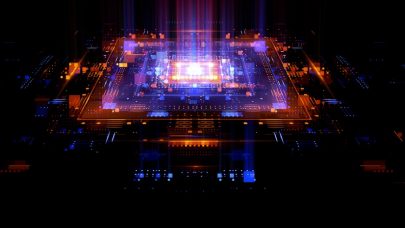This week marks the second annual Exascale Day celebration, an event that highlights the need for and potential benefits of Exascale Computing. Exascale Day gives the high-performance computing (HPC) industry a chance to reflect on the progress made in bringing exascale systems to fruition and the new research areas that they will enable.
In honor of the day, AMD and HPCwire hosted a discussion on Exascale Computing with several people involved with exascale efforts at Oak Ridge National Laboratory (ORNL). Last year, the lab announced it was building the Frontier supercomputer. Scheduled for use in 2021, Frontier is expected to have a performance greater than 1.5 exaflops, which will make it the most powerful supercomputing in the country.
In the conversation, Bronson Messer, Distinguished Scientist and Director of Science for the Oak Ridge Leadership Computing Facility (OLCF) at ORNL, noted the importance of such systems used at the lab in the OLCF. “The great thing about supercomputing is there’s no one killer app. Supercomputers, general-purpose supercomputers, can do a wide variety, the widest variety of research,” he said. “They are unique scientific instruments, and that’s been true for more than a decade now,” he said. “They have more in common with the Hubble Space Telescope and the Large Hadron Collider at CERN than they do with your desktop or your laptop.”
Exascale capabilities will help OLCF in its mission. “Some of the most challenging problems in our era are known to be computationally very intensive,” said Gina Tourassi, a Distinguished Research Scientist and the Director of the National Center of Computational Sciences and the OLCF. She noted that OLCF offers world-class computational resources and related expertise to help scientists across the globe tackle these problems, as well as deliver practical breakthroughs. Efforts of the OLCF cut across a wide range of domains from astrophysics, to nuclear science, to material science, to fusion energy. And increasingly over the past decade, OLCF has supported research in biology, biomedicine, and additive manufacturing.
Research into these broad areas demonstrates the need for Exascale Computing. The use cases for Exascale Computing are diverse and, in fact, will solve problems that are today not typically thought of as scientific. Consider the challenges in manufacturing. For example, take additive processing where a fine powder of metallic material is melted or built up, layer by layer, using a laser or an electron beam to build a part. Exascale computing can be used to run modeling and simulation routines to understand the materials’ properties and structure. “It’s an interplay between some very complex physical phenomenon, and Exascale Computing can give us insight into the link between those additive manufacturing processes, the grain structure, and the properties, and ultimately, the ability to control the process to create tot have optimal designs and ideally local properties,” said John Turner, Computational Engineering Program Director at ORNL.
Tourassi is eyeing how Exascale Computing will help biomedical research to determine how diseases manifest in our bodies and how disease spreads through a population, so that drugs or therapies can be developed to combat disease. Much of the work is focused on cancer research. However, over the past several months, Exascale Advanced High-Performance Computing has enabled advances in treatments or cocktails of treatments for people who have been exposed to COVID-19.
“We are leveraging high-performance computing, and we’re working towards Exascale Computing solutions that are all about novel artificial intelligence models that enable us to give answers to these problems, by sifting through large volumes of data, she said. As a result, researchers can use Exascale Computing to effectively search thousands of different AI models and optimize the ones that appear to be most accurate, robust, and more generalizable across the population.
Solving the Problems of the Future
Given the problems the world faces (e.g., climate change, world hunger, natural disasters), the panelists were asked if Exascale Computing has a role to play.
“I don’t think it’s a stretch at all to say that Exascale Computing will undergird all of those fields, said Messer. He believes it will become, and potentially already is, one of the most important modalities to drive knowledge forward.
“Exascale Computing helps to connect the simulation and the experimental world,” said Turner. “The scientific ecosystem of science, theory, experiments, simulations, all goes together to expand our knowledge, and Exascale really helps that whole connection.”
“From the biomedical perspective, I’m looking forward to the time that we will be able to deploy Exascale Computing to reduce the societal and economic burden of population aging,” said Tourassi. “In a world of 10 billion people, where we know that due to aging, inevitably, we will have to suffer from a disease such as cancer, Alzheimer’s, heart disease. I do believe that Exascale Computing will bring us closer to the answers we need.”
Watch the entire discussion here: https://www.hpcwire.com/imagine-the-world-of-exascale-with-oak-ridge-national-lab/
To learn more about research at ORNL and the Frontier, visit: https://www.olcf.ornl.gov/frontier/

































































